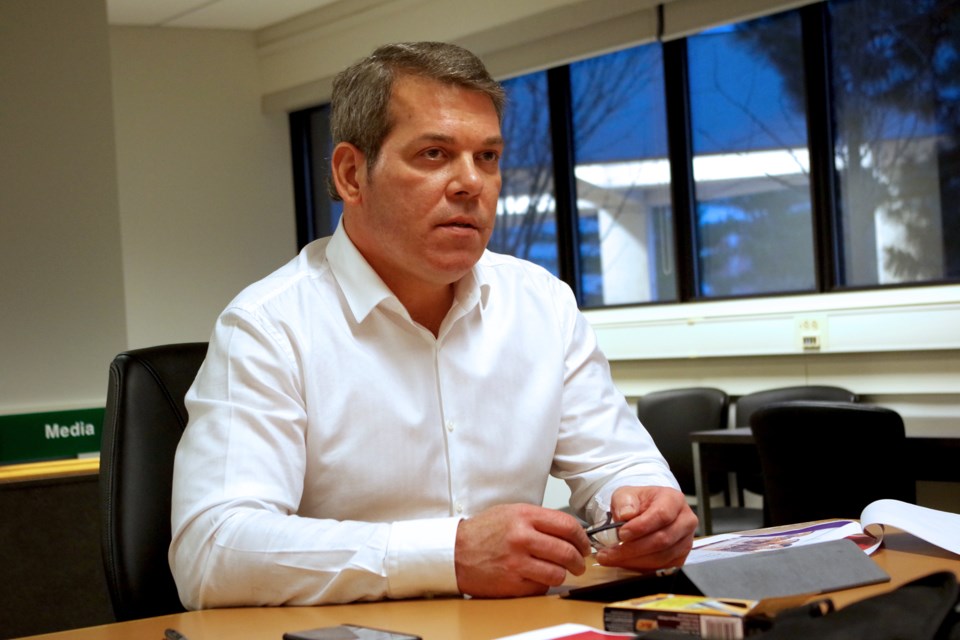While most are still poring over the numbers, Niagara Centre MP Vance Badawey wasted no time in severely criticizing the Doug Ford Ontario government after its first budget was released Thursday.
“I’m angry, yes,” Badawey told the ThoroldNews, “but more than that, I’m very concerned.”
“We took a good look at the new Ontario budget and it’s a typical Conservative budget - cut, cut, cut,” he said.
Badawey said the budget failed to address the most important issues.
“When you look at what priorities are for Canadians, you hear health care, education, infrastructure and the environment.”
“But when you look at the new Ontario budget, thousands of teachers are going to lose their jobs, leaving children with larger class sizes and in my opinion, less resources. It’s disturbing. When you look at the health care cuts, it leaves the most vulnerable in our society at risk. There’s hardly any mention of climate change or the environment. In fact there’s a 36 per cent cut in environment, conservation and parks,” he said.
The Federal Liberal argued, ”When you look at what they’re doing, a lot of it is just gimmicks that are distractions; things like licence plates, stickers on gas pumps; that’s all distractions to draw our attention away from the cuts that are being made.”
Badawey continued, “They’re cutting Indigenous affairs by 49 per cent. They’re cutting job creation by 19 per cent. They’re cutting seniors and accessibility by 13 per cent.”
In the wake of those cuts, the Ford government announced plans to take over Toronto transit. To that, Badawey charged, “Just because you were a city councillor in Toronto and you have a bias for that city, it doesn’t mean you can ignore the rest of the province.”
He went on to say the lack of attention to infrastructure is also particularly disturbing.
He said improved infrastructure through investment lowers the cost of maintenance and argued that, “We put money into the aging infrastructure for three reasons: “One, to get the work done across the nation. We’re running into an infrastructure deficit and the quality of life in municipalities is starting to be affected because of it. Two, the business aspect of maintaining infrastructure ensures that our cities are run more efficiently and the cost of running them goes down through capital investment. And thirdly, It alleviates the burden on the taxpayer and water and wastewater ratepayers.”
Badawey said you don’t have to look any farther than our own backyard to see the impact of the cuts.
“Look at the City of Thorold and their need for an operations centre. Now the only funders will be federal government and the municipality, because the province isn’t at the table. Who picks up that piece? More than likely the property taxpayer,” he said. “You lose the leveraged funding when all three levels of government aren’t at the table.”
He went on, “I called for the gas tax top-up because the province wasn’t coming to the table. And the payments to municipalities were doubled in the Federal budget. I got my way. This gave the City of Thorold $570,000 in their budget this year which alleviates pressure on the Thorold taxpayer.” (Related article.)
“This shouldn’t be about politics. Good government trumps good politics. Unfortunately, the Conservatives focus too hard on being good politicians instead of providing good government, and that’s a shame,” he said.
Badawey acknowledged that people fear hearing the word ‘deficit’ in government operations but countered, “In the current condition of the country and Ontario, we have to invest in health care, education and infrastructure or economic development, seniors; Indigenous affairs. As you make things more efficient and economy becomes better, it’s not different than running a business, those deficits eventually decrease and you balance the books over time. But right now is not that time.”
He explained, “One of the lenses that I look through, I call it the triple bottom line, is how does this decision affect the environment, the economy, the social fabric of society? When you take into consideration the answer to those three bullets, it really creates the equality and balance of the final decision. Take into consideration the effects it’s going to have on those three areas, and the provincial budget did not achieve that.”
He concluded, “It’s all about people. We’re not dealing with widgets. We have to ensure the people are looked after with respect to every background. It’s hard to do; yes, but you have to work that much harder to achieve it. This budget didn’t do it.”



